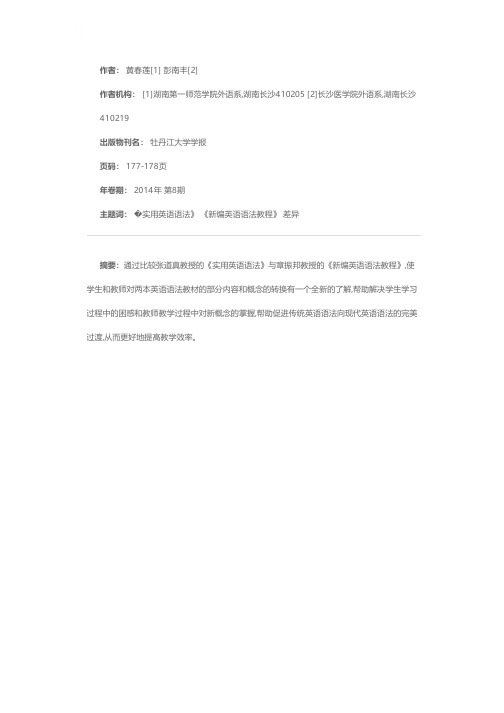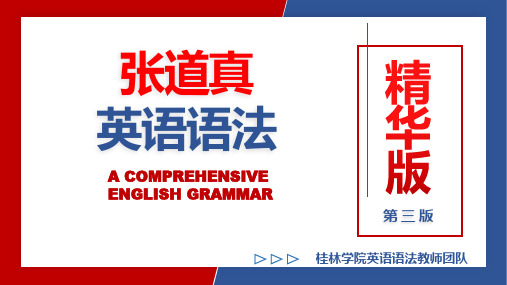张道真实用英语语法课件Chapter 11
《张道真英语语法珍藏系列》

《张道真英语语法珍藏系列》《张道真英语语法》(大众珍藏版•第二版)《张道真英语用法》(大众珍藏版•第二版)《张道真英语语法》(中学生珍藏版•第二版)《张道真英语用法》(中学生珍藏版•第二版)著名语言学家、北京外国语大学博士生导师刘润清教授清华大学外国语学院院长、博士生导师刘世生教授北京理工大学外国语学院副院长、英语语言学博士李京廉教授清华大学外国语学院英语系主任、英语语言学博士何宏华教授北京市海淀区教委英语教研员、特级英语教师聂成军倾力推荐◎作者简介张道真我国著名英语教授,权威的英语语法专家。
1926年出生于湖北沙市,1947年毕业于(南京)国立中央大学外语系。
次年赴美留学,获华盛顿大学英语硕士学位后转入哈佛大学比较文学系。
1950年回国后一直任教于北京外国语大学(原北京外国语学院)。
1996年应邀担任深圳大学校长顾问。
几十年来张道真教授潜心向学,硕果累累,先后出书十余种。
此次出版的《张道真英语语法》(大众珍藏版•第二版)、《张道真英语用法》(大众珍藏版•第二版)、《张道真英语语法》(中学生珍藏版•第二版)、张道真英语用法》(中学生珍藏版•第二版)是对张道真教授一生研究成果的一次集中总结和整理,旨在将张道真教授的经典之作发扬光大,使更多的英语语言学习者从中受益,少走弯路。
◎内容简介《张道真英语语法系列》(第二版)在第一版《张道真英语语法系列》(商务印书馆2002 年出版)的基础上修订出版。
本书修订的原则是,保持原书的编写理念、框架结构和体例格式基本不变,但版式重新设计,保留原书的精华,适当增添新内容。
主要解决了以下问题:第一,对第一版中一些过时、不妥、不确切的语法术语和中英文表达进行了全面修正和规范。
如:“主语是句子的中心”的表述目前学界并不太接受,在第二版中就不再提这一说法;I am expecting a telegram 中的电报(telegram)当今已不复存在,因此改为I am expecting a letter。
《实用英语语法》与《新编英语语法教程》之比较

作者: 黄春莲[1] 彭南丰[2]
作者机构: [1]湖南第一师范学院外语系,湖南长沙410205 [2]长沙医学院外语系,湖南长沙410219
出版物刊名: 牡丹江大学学报
页码: 177-178页
年卷期: 2014年 第8期
主题词:�实用英语语法》 《新编英语语法教程》 差异
摘要:通过比较张道真教授的《实用英语语法》与章振邦教授的《新编英语语法教程》,使学生和教师对两本英语语法教材的部分内容和概念的转换有一个全新的了解,帮助解决学生学习过程中的困惑和教师教学过程中对新概念的掌握,帮助促进传统英语语法向现代英语语法的完美过渡,从而更好地提高教学效率。
人民大2023张道真英语语法(第三版)(精华版)课件Chapter 1

-ist (scientist), -dom (freedom), -ship (friendship).
形容词词尾 -ful (careful),
-ive (active),
-less(homeless), -ous (famous),
-ish (selfish), -able(agreeable).
He admitted that his motive was profit.(作宾语) (2)连接代词或副词及 whether (if) 引起的从句:
Do you know where they are?(作宾语) (3)关系代词型的 what 引起的从句:
He began to think about what he should do.(作介词宾语) (4)由各种连词引起的从句(多用作状语):
Are you from the South or from the North? (4)反意问句(disjunctive questions):也可称 tag-questions(tag 指简 短问句):
This is your car, isn’t it?
三、单词、短语和从句
3.1 单词(words)
实词 Notional words
虚词 Form words
1.2 词尾
词类有时可以从词形上看出,如以 -ly 结尾的词多数为副词,以 -ful结尾的词 多数为形容词。现将常见的词尾举例如下:
名词词尾
-er (fighter), -tion (action), -ness (dryness),
-or (sailor), -ment(government), -ism(socialism),
(5)过去分词短语(-en participle phrases): Is there anything planned for tonight ?(作定语) Moved by his sincerity, we accepted the gift.(作状语)
1张道真英语语法全新版.ppt

0.2 Words
is composed of one or more than one morpheme.
can be classified in two ways: in terms of word-formation
grammatical function
1. In terms of Wordformation
上海外语教育出版社
About the suggestions:
• A note book strongly needed • Pre-reading being extremely essential • Homework being finished in time • Come up with your own problems
2. In terms of grammatical function
Closed-class words Open-class words
Closed-class words
Definition: Closed-class words refer to those sets of words whose items are closed or limited in number and are only exceptionally extended by the creation of additional members.
Diagram of the five ranks:
Each rank is composed of one or more than one grammatical unit of the immediate lower rank:
Sentence Clause Phrase Word Morpheme
张道真英语语法(第三版)(精华版)课件lecture 10非谓语动词补充知识点

三、分词
(一)固定用法
有的分词在句子中并没有逻辑主语,而是一种习惯 表达,如:
• Judging from his face, he must be ill.
• Generally speaking, boys are more interested in football games than girls.
• I have a lot of clothes to be washed. 我有很多衣服要洗(找别人洗)。
• Do you have anything to take to your parents? 你有东西要带给你父母吗?(自己带)
• Do you have anything to be taken to your parents? 你有东西要带给你父母吗?(别人带)
We have no choice but to turn back.
We could do nothing but obey the order. 但固定用法can't help but do sth.=have to do
不得不做,只能做 4.Why not...后面的动词不定式符号to省略。 5.情态动词(除ought外, ought to do) 6. would rather, had better
3. 不定式做状语
(1)放句首时,逻辑主语与句子主语要一致:
• wrong:To save money, every means has been tried.
• right:To save money, he has tried every means.
(2)表结果(往往是与预期愿望相反的结果意料之 外): 常放在 only后
人民大张道真英语语法(第三版)(精华版)课件句子成分导学案

You must keep it in mind that you are a student and should follow the rules of the school.
3.谓语Predicate 谓语是句子必要的成分之一,用来说明主语“做什么”、 “是什么”或“怎么样”。
练习:请划出以下句子中的补语。 I found the homework difficult. I ask students to learn dancing. She heard Jean singing They found the man honest. The teacher wants us all to become good pupils.
应该意识到......
It is agreed that...
大家一致认为......
It can not be denied that...
不能否认......
It may be said without fear of exaggeration that... 毫不夸张的说....
(3)形式主语的常用句型
归纳:主语通常由名词、__代__词_____、__动__名__词___、___从__句_____、_不__定__式_____充当。
(2)形式主语与真正主语(Formal Subject and Real Subject)
主语是不定式短语、动名词短语或分句时,常会放在____句__尾____,用it代替它原 来的位置,这个it称为__形__式___主__语___,放在句尾的原主语为真实主语。如:
It is very hard to get to sleep.(___不__定__式___是真实主语,____i_t_____是形式主语)
薄冰英语语法和张道真英语语法
薄冰英语语法和张道真英语语法1. 薄冰英语语法(BBI)和张道真英语语法(ZDZ)是我国发展起来的两种英语语法教学体系,它们分别由薄冰和张道真教授创立。
2. 薄冰英语语法(BBI)是我国专门针对英语语法进行研究的教材,薄冰教授在其长期的教学实践中总结出了一套与传统英语语法教学不同的方法和理论体系。
3. BBI 的理论基础主要是基于泛型推理法,即从一般事实推理到特殊事实,将句子所包含的语法关系规则化,简化成只用一种结构的句子,由此推导出所有可能的句子。
4. 薄冰英语语法的特点是将各种语法规则进行统一而简洁的表达,通过引入语法格言、概念关系图、逻辑网和语言概念模型等工具来加深学生对语法规则的理解。
5. 张道真英语语法(ZDZ)是我国教育界著名英语语法学者张道真教授在长期的教学和研究工作中总结出的一套英语语法教学理论和方法,得到了广泛的认可。
6. ZDZ 的理论基础主要是基于交互式教学法,即通过师生互动和合作学习的方式引导学生学习语法知识,强调语法知识的实际应用能力和交流表达能力。
7. 张道真英语语法的特点是注重语法知识的系统性和实用性,通过例句分析、语法小结和练习等手段来帮助学生掌握和运用英语语法知识。
8. 薄冰英语语法和张道真英语语法在英语教育领域都有着一定的影响力,它们以其独特的教学理念和方法为我国学生的英语语法教学提供了新的思路和途径。
9. 根据学生的实际情况和学习需求,选择适合自己的教学理论和方法进行学习和教学,对于提高学生的英语语法水平和综合语言能力都具有一定的指导意义和借鉴价值。
10. 在未来的教学实践中,希望薄冰英语语法和张道真英语语法能够继续不断创新和完善,为我国英语教育事业做出更大的贡献。
11. 薄冰英语语法和张道真英语语法的出现,标志着我国英语教育领域的不断发展和进步。
这两种语法教学体系的出现,为英语语法教学注入了新的理念和方法,为学生提供了更丰富的学习资源。
12. 薄冰英语语法强调泛型推理法,即通过一般事实推理到特殊事实,简化语法规则,使学生能够更快地掌握英语语法知识。
张道真英语语法(第三版)(精华版)课件lecture 8 -9非谓语动词
• It is necessary ___fo_r__ you to go there in person.
Lecture 8
Non-finite Verbs 非谓语动词
• 学习非谓语动词,关键需要掌握以 下内容:
1.非谓语动词在句中充当的成分;
2.非谓语动词的时态和语态。
动词的非谓语形式有三种: 1.不定式(The Infinitive):to +v 2.动名词(The Gerund),v-ing 3.分词(The Participle)
see, hear等词
• +sb.+do sth.强调动作的真实性、完整性; I saw him work in the garden yesterday. 强调“我看见了”这个事实。 • +sb.+doing sth. 强调动作的连续性、进行
性。 I saw him working in the garden yesterday. 强调我见他“正在干活”这个动作。
1)现在分词(The Present Participle) v-ing
2)过去分词(The Past Participle) v-ed
Infinitive
不定式
1.
• It’s kind/wise/clever… of sb. to do sth It is very kind of you to help us.
In the past, traveling by plane was unimaginable for most Chinese people.
- 1、下载文档前请自行甄别文档内容的完整性,平台不提供额外的编辑、内容补充、找答案等附加服务。
- 2、"仅部分预览"的文档,不可在线预览部分如存在完整性等问题,可反馈申请退款(可完整预览的文档不适用该条件!)。
- 3、如文档侵犯您的权益,请联系客服反馈,我们会尽快为您处理(人工客服工作时间:9:00-18:30)。
The usage of some main auxiliary verbs
B. have
b. Used as transitive verb 1) To show one’s belongings e.g. Mr. Green had living with him a nephew and a niece. The house has five rooms. I have an impression that he’s been improving.
The usage of some main auxiliary verbs
A. be c. be + infinitive
3) be able to do sth
e.g. How am I to pay such a debt? Not a sound was to be heard. 4) The thing that is due to happen someday e.g. The worst is still to come. They said goodbye, little knowing they were never to meet again.
The usage of some main auxiliary verbs
C. do a. auxiliary verb
1) To form negative sentence and interrogative sentence e.g. Does he work here? He lives here, doesn’t he? Didn’t she sing well?
The usage of some main auxiliary verbs
A. be
c. be + infinitive
1) To indicate the thing planed to do, similar to “be going to” e.g. I am (was) to play Juliet. The President is to make a statement tomorrow. She was to have got married last month. 2) The thing that should be done (should, must, ought to, have to, etc.) e.g. Suppose he comes here, what am I to tell him? You are not to smoke in the room.
The usage of some main auxiliary verbs
B. have
c. To form some sentence patterns
2) have + n. / pron. + V.pp e.g. He’s having them repaired. The pilot had his plane hijacked. 3) have + n. / pron. + V.ing e.g. He tried to have her talking, but no use. She soon had us all laughing.
The usage of some main auxiliary verbs
C. do
b. transitive verb
2) Added with gerund e.g. He does some writing in his spare time. She did lots of acting when she was at university. I did some reading before I went to bed. 3) Added with some nouns indicating object e.g. We did the journey in six hours. We did two concerts last week. Have you done your teeth?
Chapter 11
Auxiliary Verbs and Modal Verbs
Warming-up
Discussion Do you know anything about auxiliary verbs? Can you give some examples?
Introduction
Three main groups of auxiliary verbs A. be, am, are, is, was, were, been, being B. have, has, had, having C. do, does, did
The usage of some main auxiliary verbs
B. have
a. auxiliary verb 1) To form perfect tense and perfect continuous tense e.g. I’ve seen this film before. They had already told me the news. What has she been doing since? 2) Perfect forms e.g. I’m pleased to have made your acquaintance. I regretted having been so rude to him. Not having got an answer, he was rather worried.
The usage of some main auxiliary verbs
B. have
c. To form some sentence patterns
4) have (got) to e.g. I had to walk very fast to overtake you. These last two days I have had to take a rest. We may have to cancel the plan. 5) have got (= have) e.g. She hasn’t got a bank account. I’ve got one or two things to see to. It was acute pneumonia that she had got.
The usage of some main auxiliary verbs
C. do
a. auxiliary verb
2) To emphasize sth before the verb e.g. I did see her at the party. Do come with us. 3) To indicate the action mentioned before to avoid repetition e.g. Tom talks too much. — Yes, he does. She doesn’t drive but I do. He didn’t see you, did he?
The usage of some main auxiliary verbs
A. be
a. Auxiliary verbs
1) In various tenses e.g. I’m seeing a friend off. He was groping in the dark, so to speak. What were you doing when I called?
The usage of some main auxiliary verbs
A. be b. Other verbs
1) Used as link-verb e.g. He is (was) an atheist. Be always on your guard. He had (has) been in Beijing for five ye main auxiliary verbs
C. do
c. intransitive verb
1) To indicate the situation in study, work, etc. e.g. He’s doing well at school. She is doing nicely. Everything in the garden is doing well. 2) To indicate “that’s enough, that’s OK, suitable, etc.” e.g. This place would do for a gymnasium. That jacket won’t do for skiing.
The usage of some main auxiliary verbs
B. have
b. Used as transitive verb
2) To show some actions by plus nouns (P256) e.g. have a long walk have a drink of water have a fight have a bath 3) To mean eat, drink, have illness, etc. e.g. They are having fish for supper. Will you have a cigarette? Do you often have colds?
The usage of some main auxiliary verbs
B. have
c. To form some sentence patterns
